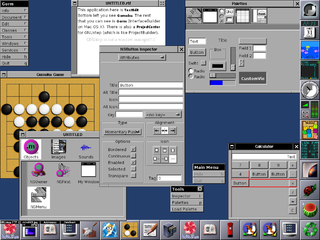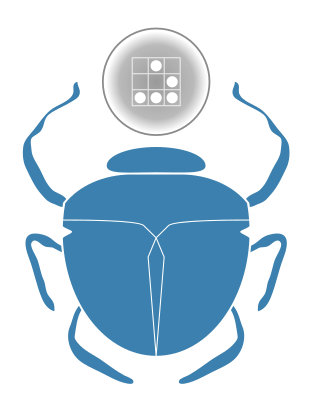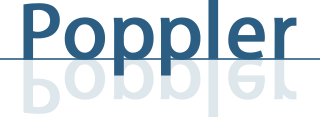
A graphical user interface, or GUI, is a form of user interface that allows users to interact with electronic devices through graphical icons and visual indicators such as secondary notation. In many applications, GUIs are used instead of text-based UIs, which are based on typed command labels or text navigation. GUIs were introduced in reaction to the perceived steep learning curve of command-line interfaces (CLIs), which require commands to be typed on a computer keyboard.

GNUstep is a free software implementation of the Cocoa Objective-C frameworks, widget toolkit, and application development tools for Unix-like operating systems and Microsoft Windows. It is part of the GNU Project.

Enlightenment, also known simply as E, is a compositing window manager for the X Window System. Since version 0.20, Enlightenment also supports Wayland. It is shipped with some Linux distributions such as Bodhi Linux and Pentoo.
freedesktop.org (fd.o), formerly X Desktop Group (XDG), is a project to work on interoperability and shared base technology for free-software desktop environments for the X Window System (X11) and Wayland on Linux and other Unix-like operating systems. Although freedesktop.org produces specifications for interoperability, it is not a formal standards body.
X.Org Server is the free and open-source implementation of the X Window System (X11) display server stewarded by the X.Org Foundation.

Cairo is an open-source graphics library that provides a vector graphics-based, device-independent API for software developers. It provides primitives for two-dimensional drawing across a number of different backends. Cairo uses hardware acceleration when available.

GDK is a library that acts as a wrapper around the low-level functions provided by the underlying windowing and graphics systems. GDK lies between the display server and the GTK library, handling basic rendering such as drawing primitives, raster graphics (bitmaps), cursors, fonts, as well as window events and drag-and-drop functionality.

In computing, a virtual desktop is a term used with respect to user interfaces, usually within the WIMP paradigm, to describe ways in which the virtual space of a computer's desktop environment is expanded beyond the physical limits of the screen's display area through the use of software. This compensates limits of the desktop area and is helpful in reducing clutter of running graphical applications.

In computing, a tiling window manager is a window manager with the organization of the screen often dependant on mathematical formulas to organise the widows into a non-overlapping frame. This is opposed to the more common approach used by stacking window managers, which allow the user to drag widows around, instead of widows snapping into a position. This allows for a different style of organization, although it strays from the traditional desktop metaphor.
Desktop Window Manager is the compositing window manager in Microsoft Windows since Windows Vista that enables the use of hardware acceleration to render the graphical user interface of Windows.
A compositing manager, or compositor, is software that provides applications with an off-screen buffer for each window. The compositing manager composites the window buffers into an image representing the screen and writes the result into the display memory.

Poppler is a free and open-source software library for rendering Portable Document Format (PDF) documents. Its development is supported by freedesktop.org. Commonly used on Linux systems, it powers the PDF viewers of the GNOME and KDE desktop environments.

ImageMagick, invoked from the command line as magick, is a free and open-source cross-platform software suite for displaying, creating, converting, modifying, and editing raster images. ImageMagick was created by John Cristy in 1987, it can read and write over 200 image file formats. It is widely used in open-source applications.

fpGUI, the Free Pascal GUI toolkit, is a cross-platform graphical user interface toolkit developed by Graeme Geldenhuys. fpGUI is open source and free software, licensed under a Modified LGPL license. The toolkit has been implemented using the Free Pascal compiler, meaning it is written in the Object Pascal language.

OpenGEU was a free computer operating system based upon the popular Ubuntu Linux distribution, which in turn is based on Debian. OpenGEU combined the strengths and ease of use of GNOME desktop environment with the lightweight, and graphical eye candy features of the Enlightenment window manager to create a unique and user-friendly desktop. While OpenGEU was originally derived from Ubuntu, the design of the user gave it a significantly different appearance, with original art themes, software and tools.

Okular is a multiplatform document viewer developed by the KDE community and based on Qt and KDE Frameworks libraries. It is distributed as part of the KDE Applications bundle. Its origins are from KPDF and it replaces KPDF, KGhostView, KFax, KFaxview and KDVI in KDE 4. Its functionality can be embedded in other applications.

Wayland is a communication protocol that specifies the communication between a display server and its clients, as well as a C library implementation of that protocol. A display server using the Wayland protocol is called a Wayland compositor, because it additionally performs the task of a compositing window manager.

GTK is a free software cross-platform widget toolkit for creating graphical user interfaces (GUIs). It is licensed under the terms of the GNU Lesser General Public License, allowing both free and proprietary software to use it. It is one of the most popular toolkits for the Wayland and X11 windowing systems.

PhotoLine is a general purpose bitmap and vector graphics editor developed and published by Computerinsel GmbH for Windows, macOS, and Linux/Wine. It was originally created in 1995 by Gerhard Huber and Martin Huber. The program combines bitmap and vector graphics editing in one seamless working application unlike most graphics software which tend to focus on either bitmap or vector editing and output. PhotoLine is considered as a market competitor to Adobe Photoshop.

Hollywood is a commercially distributed programming language developed by Andreas Falkenhahn which mainly focuses on the creation of multimedia-oriented applications. Hollywood is available for AmigaOS, MorphOS, WarpOS, AROS, Windows, macOS, Linux, Android, and iOS. Hollywood has an inbuilt cross compiler that can automatically save executables for all platforms supported by the software. The generated executables are completely stand-alone and do not have any external dependencies, so they can also be started from a USB flash drive. An optional add-on also allows users to compile projects into APK files.















